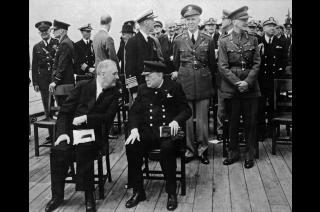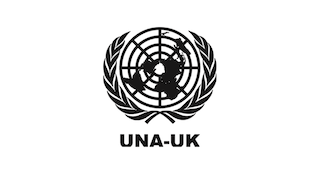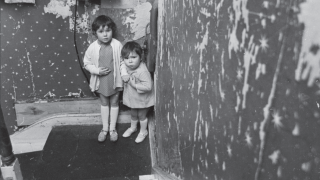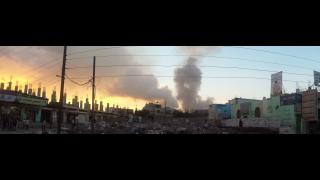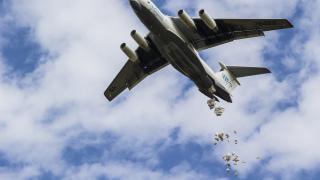The UK and the UN
The UK is one of the UN's founding members. Plans for the United Nations were drawn up during the Second World War. On 14 August 1941, US President Franklin D. Roosevelt and UK Prime Minister Winston Churchill proposed a set of principles for international collaboration on peace and security in a document known as the Atlantic Charter. The image shows the two leaders chatting on the deck of HMS Prince of Wales on the day of the agreement (UN Photo).
The Charter was later endorsed by the 26 Allied nations fighting against the Axis powers. In 1943, the UK, US, China and USSR agreed to begin work on an international organisation that would seek to fulfil this aim. Initial plans were drawn up the following year and in 1945, 50 countries met in San Francisco to draw up the UN Charter.
Since then, the UK has continued to shape the United Nations and its work.
Budget contributions
The UK is the fifth-largest contributor to the UN's regular budget, contributing 5.19% of the budget - or £82m - in 2014. (Payments to the UN are based on a state's relative ability to pay, with Gross National Income serving as a yardstick. Poor and heavily-indebted countries pay reduced rates, while the US's contribution has been capped at 22%.)
The UK is also the fifth-largest contributor to the UN's peacekeeping budget, paying for 6.68% of $7bn a year. Peacekeeping contributions are based on a similar formula as the UN's regular budget, with a surcharge levied on the five permament members of the Security Council - of which the UK is one. This reflects their role in authorising missions.
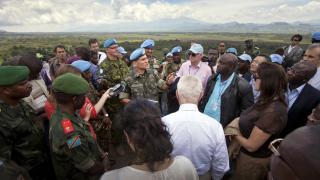
Security Council role
As one of the five permanent members of Security Council, the UK has particular responsibility for the maintenance of international peace and security. It plays a key role in the adoption of resolutions on confict situations, including those mandating the use of force, and - like the other permanent members - has the right of veto over substantive decisions.
It is heavily involved in the selection of the UN Secretary-General. The appointment process involves the Security Council putting forward a single candidate for the UN General Assembly to endorse.
The UK can also shape the Council's agenda. One particular priority for the UK has been women, peace and security. It has initiated a number of resolutions on issues such as sexual violence in conflict and the inclusion of women in peace processes.
In the picture, UK Ambassador to the UN in New York, Sir Mark Lyall Grant (centre, pink shirt), is on a Security Council mission to Goma in the Democratic Republic of the Congo. The delegation is being briefed by the commander of the UN peacekeeping force in the country. (UN Photo / Sylvain Liechti)
Development and human rights
The UK is not just involved with the Security Council. It plays an active role in the UN's activities across the board. As a major contributor of development assistance, the UK works with the UN in New York on development strategy, and on with UN agencies on the ground on development programmes. The UK Prime Minister recently co-chaired a UN panel that looked at the future of the UN's development agenda.
The UK is an active member of the UN's Human Rights Council, having been recently elected to the Council. This means it contributes to the development of human rights laws and norms, and to the protection of human rights in specific country situations.
In all of its work at the UN, the UK has been particularly keen to champion reforms to promote efficiency and transparency. It has also served on the UN's Board of Auditors.
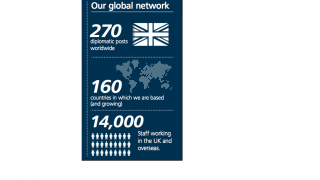
Which parts of the UK government work with the UN?
Various government departments work with the United Nations, from the Department of Energy and Climate Change, which is involved in negotiations on a global climate agreement, to the Department for Business, Skills and Innovation, which has a role in regulating arms transfers under the international Arms Trade Treaty that the UK helped to secure.
Below, we highlight four parts of the UK Government that work particularly closely with the UN on a variety of issues.
Foreign & Commonwealth Office
The FCO promotes the UK's interests overseas, supporting British citizens and businesses around the globe. The department is responsible for:
- safeguarding the UK’s national security by countering terrorism and weapons proliferation, and working to reduce conflict
- building the UK’s prosperity by increasing exports and investment, opening markets, ensuring access to resources, and promoting sustainable global growth
- supporting British nationals around the world through modern and efficient consular services
The FCO has a worldwide network of over 14,000 people in nearly 270 diplomatic offices. It works with international organisations, incuding the United Nations, to promote global security.
This includes managing terrorist incidents and ensuring that the UK makes the best use of its intelligence. The FCO works on national cyber strategies, the prevention of organised crime and drugs smuggling and counter espionage. These efforts are mirrored at the international level, where the UK has lobbied successfully for treaties to strengthen international security.
In 2013, for example, after 10 years of FCO campaigning and seven years of negotiation by UK staff, the Arms Trade Treaty was agreed at the United Nations. The Treaty will save lives and prevent the sales of arms being used in serious violations of human rights.
In terms of human rights, the UK has worked on issues at the UN ranging from preventing torture and the death penalty to promoting women’s rights and freedom of religion. In 2012-13 the FCO dedicated £6.5 million to human rights and democracy and launched a new initiative to combat sexual violence in conflict.
The view from the ground: The FCO has 90 blogs, over 230 Twitter accounts and over 140 Facebook pages, which do everything from provide travel advice to host Q&A sessions on foreign policy.
The picture shows British military and humanitarian experts setting up a medical treatment centre for victims of the Ebola outbreak in Sierra Leone. The facility will have 92 beds and be operated by military engineers and medical staff. DFID is working with Save the Children on a long-term plan to manage the facility. The project follows a request for assistance from the World Health Organisation and government of Sierra Leone. (Rob Holden Photography/Save the Children/DFID)
Department for International Development (DFID)
DFID leads the UK’s work to eradicate extreme poverty, with a particular focus on ending the need for aid by creating jobs, unlocking the potential of girls and women and helping to save lives when humanitarian emergencies hit.
The department is responsible for:
- honouring the UK’s international commitments and taking action to achieve the Millennium Development Goals - the UN's anti-poverty initiative
- making British aid more effective by improving transparency, openness and value for money
- targeting British international development policy on economic growth and wealth creation
- improving the coherence and performance of British international development policy in fragile and conflict-affected countries
- improving the lives of girls and women through better education and a greater choice on family planning
- preventing violence against girls and women in the developing world
- helping to prevent climate change and encouraging adaptation and low-carbon growth in developing countries
UK Mission to the UN in New York
The UK Mission represents the UK in every negotiation that takes place in New York, ensuring that Britain’s interests and views are taken into account by UN bodies and the other member states. The UK plays a key role in all aspects of the Security Council’s work, providing information from the UK’s diplomatic network, negotiating, and lobbying for appropriate actions and resolutions. The UK Mission also works to improve the way the UN works. It plays an important part in efforts to reform the Security Council, improve the UN’s finances and strengthen the UN’s capacity to deal with economic and social issues, peacekeeping and conflict prevention.
The Mission's priorities are:
- Preventing and resolving conflict through the UK Mission
- Countering weapons proliferation through the UK Mission
- Improving the UN through the UK Mission
- Promoting human rights through the UK Mission
- Promoting an effective humanitarian response at the UN through the UK Mission
- Supporting conflict resolution in fragile states through the UK Mission
UK Mission to the UN in Geneva
Geneva is host to a vast range of UN bodies, agencies and programmes, as well as the headquarters of important non-UN organisations such as the World Trade Organisation, the International Organisation for Migration and the International Committee of the Red Cross. The UK Mission is arranged into four main teams covering human rights, trade and economic issues, health and humanitarian issues and arms control and disarmament. Between them, they cover the work of some 30 international organisations to which the UK contributes approximately £0.5 billion a year. The UK's Ambassador to the UN in Geneva is Karen Pierce (pictured).
The Mission's priorities are:
- Working with the UN for stronger international human rights institutions
- Improving global trade and increasing opportunities for UK business
- Strengthening arms control to enhance Britain's security
- Supporting human rights in the UN
- Improving the international health system
- Improving the efficiency of the UN and other international organisations in Geneva

